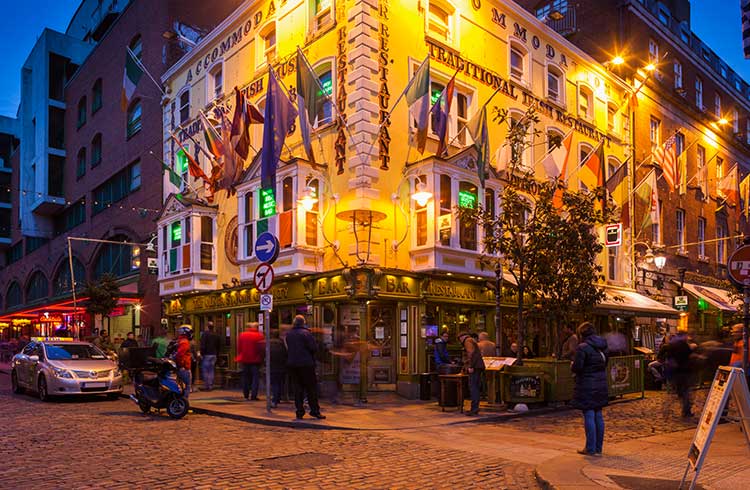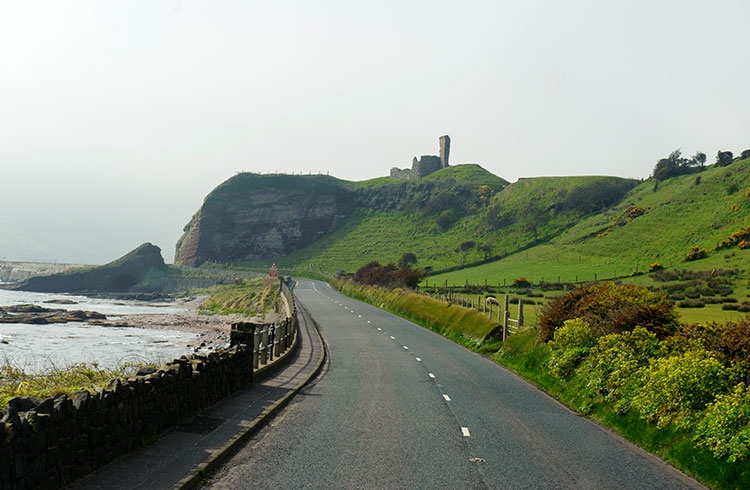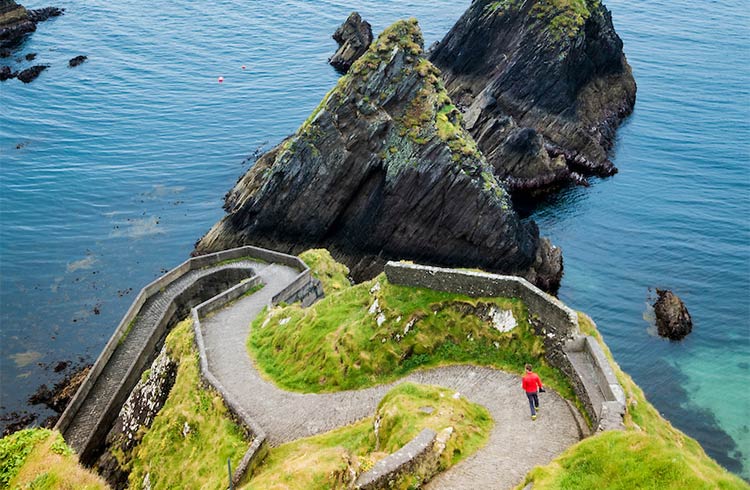Crime in Ireland: What Travelers Need to Know From a Local
Do travelers need to worry about crime in Ireland? We asked Ronan O’Connell to share his insights after living in Ireland on-and-off for the past few years. Here’s what you need to know to stay safe.
 Photo © Getty Images/Walter Bibikow
Photo © Getty Images/Walter Bibikow
It happened so quickly that I had no time to react. As I walked through downtown Dublin, near its famous Spire of Dublin monument, from the corner of my eye I saw a man making a beeline for me. When this stranger bumped into me, I felt a strong tug at my pants pocket. I swung around and he had disappeared into the crowd. Only the zips on my pockets had stopped this thief from stealing my wallet.
Ireland is a famously safe, friendly country, but no country is without crime, as this encounter proved. Here are the crime-related issues to consider on your trip to Ireland.
- Steering clear of political trouble
- How to avoid theft
- Nightlife safety in Ireland
- Credit card crime in Ireland
- Listen to The World Nomads Podcast episode on Ireland
Steering clear of political trouble
The relationship between the Republic of Ireland and Northern Ireland, which is part of the UK, has been a controversial issue for almost 100 years since Ireland was divided into two in 1921. Northern Ireland has suffered many terrorist incidents in the past 50 years linked to ongoing unrest between Irish Republicans and British Loyalists.
Most recently, in April 2019, a woman journalist was shot dead during violent political demonstrations in the city of Derry, although such violence has become much rarer since 1998 when the Northern Ireland Peace Process began.
The mess that is “Brexit” – the UK’s plan to withdraw from the European Union – has prompted greater agitation and created uncertainty about whether a strict land border will be enforced between Ireland’s south and north. If you plan to visit both parts of Ireland during your holiday, we recommend you check the latest news on this border situation, and whether you will need separate Irish and UK tourist Visas. At the time of writing, this was still undecided.
Fortunately, travelers to Ireland very rarely get caught up in the country’s political problems and can easily stay safe by using common sense. Throughout Northern Ireland, and in border towns in the Republic, tourists should avoid any public discussions about politics or religion. Do not attend political rallies, and do not wear clothes linked to Catholics or Protestants, like Celtics or Rangers Scottish football jerseys.
Meanwhile, the colorful political murals painted on buildings in many parts of Northern Ireland are a great way to learn about the cultural history through art. Don’t forget that they represent serious, ongoing issues for locals. So, while you look at these murals, be as unobtrusive and respectful as possible.
How to avoid theft in Ireland
Rates of theft in Ireland are low by global standards. Travelers, however, at are greater risk of being victims of these crimes due to frequenting major Irish tourist attractions, which are magnets for petty criminals. The most dangerous spots for theft and robbery are the downtown areas of popular tourist cities Dublin, Cork, Galway and Belfast, as well as outdoor locations such as the Cliffs of Moher and the Ring of Kerry, a scenic drive around the southwest of Ireland.
At rural locations like these, thieves may also target parked cars. Many visitors hire cars to drive around Ireland, and when they visit lookouts or go hiking, they leave suitcases and valuables inside cars. Thieves can quickly and easily break into their vehicles to fleece them.
In cities, the biggest threat comes from pick pockets. Europe is home to countless gangs of experienced pick pockets who hop around the EU from city to city targeting tourists. If you walk around carrying valuables in a pocket that isn’t zipped shut, you’re going to be an easy target.
The bottom line – if you have zips on your pockets and don’t leave valuables in sight in your parked car, you can massively reduce your chances of theft and robbery.
How to stay safe on a night out
Ireland is world-renowned for its nightlife. The main entertainment precincts of Dublin, Cork and Galway attract international visitors who are keen for a rowdy night of drinking Guinness beer and Irish whiskey. This has created attractive destinations for criminals seeking to rob and steal from drunk travelers.
The most obvious way to protect yourself against this is by not getting so inebriated that you make yourself a soft target. But it also helps to be aware of common techniques used by criminals in these areas:
- Many criminals will approach tourists and pretend to be a friendly local, keen to show you an amazing, little-known Irish pub. Don’t follow them
- Strangers may also try to distract you by hugging you or asking you to join them in singing an Irish song. Politely decline – they may be distracting you or setting you up for a theft or robbery.
This doesn’t mean you need to be paranoid and unfriendly to locals while in Ireland’s nightlife areas. Just be cautious. That includes keeping an eye on your beer or glass of wine to protect against drink spiking. Although this crime carries a maximum penalty of 10 years’ jail in Ireland, it remains a significant problem, particularly in places like Dublin’s Temple Bar district and Galway’s Latin Quarter.
Credit card crime in Ireland
There is at least US $40 million worth of card-related fraud in Ireland each year. More than half of this is what Irish police call “Card Not Present” fraud. That’s where a criminal uses stolen credit card details to make purchases over the internet or phone.
The most common way criminals gain these details is through card skimming, where a small device is attached to an ATM or card reader that records the details of every card that is scanned.
Irish police in recent years have arrested dozens of criminals linked to card skimming, but have warned it remains prevalent. These criminals target ATMs which are vulnerable, like those in the walls of pubs or convenience stores.
The best way to protect against skimming is to use ATMs that are inside banks, making them far harder for criminals to access and tamper with.
Listen to The World Nomads Podcast episode on Ireland
Related articles
Simple and flexible travel insurance
You can buy at home or while traveling, and claim online from anywhere in the world. With 150+ adventure activities covered and 24/7 emergency assistance.
Get a quote

No Comments